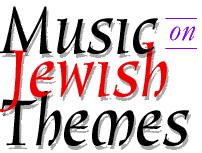![[photograph of Daniel Kazez]](images/dkphoto.jpg)

![[photograph of Jeruzalémská Synagogue]](images/concertsites/prague.jpg)
Saying
Good-Bye to Bruch
by Daniel Kazez
Three years ago,
a woman visited my university to participate in a Holocaust conference.
She was set to give a dramatic presentation with violin accompaniment,
only to find that her violinist was ill and had not arrived on
campus. With twenty-four hours’ notice, I was called to
fill in, on cello. The next day’s performance, which was
quite a success, spurred me to consider performing art music
inspired by my own Jewish tradition. (My father is a Sephardic
Jew who emigrated to the U.S. from Turkey after World War II,
in search of further education. My mother is of Ashkenazic descent.)
After several years scouring the nation’s libraries and
databases for scores, I unearthed a body of wonderful, but mostly
rarely performed, compositions.
I have had the good fortune to perform concerts of what I call “Music on Jewish Themes” in many of the cultural capitals of Europe: in Prague (at the Jeruzalémská Synagogue, as part of the 1995 Prague International Festival of Jewish Culture); in Berlin (at the College Music Society’s International Conference, in a lecture and performance entitled “Expression of Jewish Musical Style and Extramusical Associations in Art Music for the Violoncello”); in Rome (at the Centro Ebraico Italiano, the Jewish Cultural Center for Rome and all of Italy); in Florence (at the Tempio Israelitico, one of the major sights of Florence, often cited as the world’s most beautiful synagogue); in Paris (at Temple Victoire, also known as the Rothschild Synagogue, one of the world’s largest synagogues); in Brussels (at Cercle Ben Gurion, a benefit concert); and in London (at the Jewish Museum of London, sponsored jointly by the Manor House and the Sternberg Centre for Judaism). More recently, I performed in Toronto and I spent two days in residence at Northern Illinois University, lecturing on “Jewish music” and the cultural activities of Diaspora populations.
Up until a few years ago, Bruch and Bloch were the mainstays of Jewish repertoire. One of the best known ostensibly Jewish works for cello, Bruch’s Kol Nidrei, 1881, is arguably less Jewish than many other works of music. Bruch, a non-Jew, learned of Jewish traditional tunes from Abraham Jacob Lichtenstein, a nineteenth century cantor. Kol Nidrei is, in essence, a short cello concerto in the Romantic tradition which begins with the Kol Nidrei melody.
The music that I include on my programs has a clear Jewish connection, usually in the title itself. More important, I choose music in which the melodies and rhythms have an audible connection to Jewish sources—music that, from beginning to end, has been profoundly influenced by Judaism. Below are some compositions I have included in my programs, along with relevant biographical information on the composers.
![]()
![]() Home
Home![]() International
concerts
International
concerts![]() Why Jewish music?
Why Jewish music?
![]() Some composer biographies
Some composer biographies![]() Recent special programs
Recent special programs
![]()
Daniel Kazez, Professor Emeritus of Music
Wittenberg University
Springfield, Ohio USA